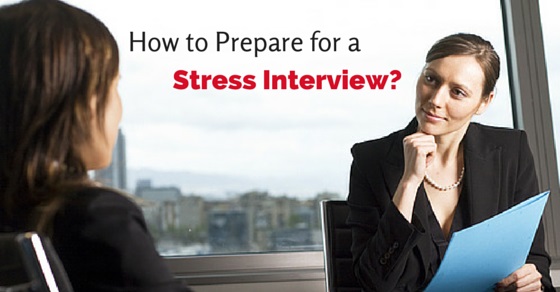Stress interviews can be nerve-wracking sessions that are conducted by professionals or panels with long-term experience in the industry. These job interview process can be extremely severe and can take many forms depending on the strategies, job interview techniques used by the interviewer.
The employer may ask an inappropriate question or challenging task or might seem uninterested to listen, to generate stress over the interviewee. The interviewer mainly conducts stress interview with the use of an assortment of psychological assessments to evaluate how candidates react to stressful situations or handle stress at work. The main motto of the interviewer during this session is to create the situation as problematic for the candidate as possible.
Generally, interviewees are not notified in advance for their participation in a stress interview. It is because the interviewer wishes to see the candidate’s reaction to the occurrence of an unexpected, stressful, and uncomfortable situation, like a stress reaction.
Stress Interview Techniques: Most Common Interview Tactics:
The following mentioned are few job interview tips on how to you deal with stress interview and ways for dealing with stress.
1. Aggressive or Painful Questioning:
This is a typical situation, where an interviewer may ask the candidate a very direct and unexpected question, like “Why you were fired from the previous job?” Such questions are outlined to detect the candidate’s calmness and behavioral response to stress or when an unexpected and uncomfortable question is asked.
2. Aggressive behavior or Interview Attitude:
Another very certain way of the interviewer is that he may act with an aggressive behavior or attitude during the session. It helps them to understand how a candidate will deal with individuals with fault finding and aggressive behaviors.
3. Puzzle or Brainteaser interviews:
This is an interesting way of stressful interview, which is mainly organized by management firms. The interviewer may ask any questions, like, “What is the average number of vehicles run in the USA every day?” The interviewer may ask such questions to test the logical thinking ability, analytical skills and thought process of the interviewee.
4. Unexpected Behaviors during Interview:
Don’t get afraid if the employer asks you any question that is not relevant, or related to your field, or is totally unexpected at the moment. Even, maybe the interviewer may ask you the single question again and again to generate stress for you. This tactic of an interviewer is supportive to test how patient, relaxed, and wise an interviewee is during the arrival of such situations.
5. Case Interviews:
In such interview sessions, the interviewee is presented with an artificial or made-up of real-world business. The candidate’s job in such situation is to bring a wise solution to the problem. This form of stress tests the quantitative and analytical skills, knowledge and interest of present business concepts and issues, ability to prioritize issues, and ability to communicate effectively.
Besides these techniques, the interviewers may utilize even other strategies to judge behavioral and action response of the candidate during different circumstances. Other such strategies are:
- Seeming uninterested to listen
- Always interrupting the candidate while speaking
- Asking and focusing on only one question
- Creating an argument with the candidate
- Acting hostile towards the candidate
- Intentionally delaying interviews
- Interrogating the candidate whether they have anything to add to such responses
Ways to Respond to Stress Interview Questions:
- No matter how much irritating a question is, staying calm and responding all job interview questions wisely is the key to succeed in such interviews. Besides this, there are other strategies on which you can rely while you respond to tricky questions asked during a stress interview session.
- The interviewer is interested to see how well you are in handling criticism. So, don’t panic and try to refrain from getting offended.
- Make sure you answer questions only after carefully listening to them. Once you are firm then deliver a response. Don’t backtrack your response even if the interviewer is trying to state that you have given an incorrect answer.
- Keep yourself cool and always try to behave professionally.
- You can even ask the interviewer to try to clarify the question to understand what sort of answer he is looking to.
- Don’t attempt to focus on delivering a right response to a question. Rather, you should try to concentrate on providing an answer that can solve the problem in the best way.
- Be direct, polite, open, and honest. But make sure, that you do not allow the interviewer to intimidate you emotionally. Remember that he is there to criticize you and make you feel as much uncomfortable as possible. Don’t allow him to succeed in his intentions.
- If you think that a question is lacking any vital information, then you can state assumptions from your side. But make sure that you don’t start augmenting with the interviewer as then it can mess up the entire situation.
Common Stress Interview Questions:
It is true that the overall flow of the interview session may vary depending on the strategy used by the interviewer. But, there are some questions that are common to all types of stress interviews and are mainly asked to generate more stress pressure on the candidate.
1. See that pen stand on the table? Try selling it to me.
2. Assume you are working here and you have to sell your company’s products to me in a foreign nation. Also, I don’t speak any other language than Spanish. Now how would you deal with me and try to bring the business?
3. Give me an example of a situation at the workplace where you have to work under pressure?
4. What is the worst thing that you have heard from others about our organization?
5. Tell me about a situation when your work was rejected?
6. Give us an example of an incidence when you worked in a team and faced too many stressful situations?
7. How have you handled a problematic boss at the job?
8. (Following to your answer to a recent question) Do you wish to change your answer or do you find it the best?
9. Do you think you have given a correct response to the question that I asked? Can you repeat the answer again?
10. What are the techniques do you use to deal with the stress?
11. Are you comfortable working under a stressful situation?
12. Are you aware of truck tires that are available in the United States?
13. Evaluate me as an interviewer on a scale of 1 – 10?
14. Why should I appoint an outsider like you when I have someone within the organization who is familiar with me and my work culture?
15. Do you feel comfortable working with troubling people?
16. What would you do if you discover that you are more qualified than your boss?
17. Why do you wish to change your present job? Were you facing compatible issues with your seniors or colleagues?
18. What are your worst characteristics?
Stress Questions Asked in Interview for Freshers:
There are rare cases when a fresher is interviewed at high-stress levels. But the key is that anything can happen! There are organizations that can conduct stress interviews for even freshers. The main motto of planning such discussion sessions for newbies is to understand how intelligently, and activities they can respond to different situations at the workplace.
It is of more importance where the working conditions are dynamic and where the newly appointed candidate has to deal with various types of employees or colleagues at the workplace. So if you are a fresher, then it is recommended that even you prepare yourself for encountering a stress interview. Some questions related to this are:
1. Give us an impressive introduction of yourself?
2. How has your qualification prepared you for a great career ahead?
3. What is according to you, an ideal job?
4. What kind of boss are you expecting at your first job?
5. What would you do if after joining you find it a little difficult to work with your boss?
6. What makes you better for this job than other candidates with same qualifications?
7. Have you decided any criteria for an organization with which you will be starting your career?
8. Why did you select that college to complete your studies?
9. List one or two of your biggest achievements while you were a student in your college?
10. What would you do if you have to handle a stressful situation at work with strict deadlines, all alone?
Most interviewers conduct such sessions to judge how the interviewee reacts during unprepared situations. Such interviews are usually organized to fill stressful jobs or high-pressure jobs that require constant adaptations. The candidates, who stay assertive, calm, remain focused and maintain adequate boundaries can handle the questions asked in interview session.
There are rare employees who enjoy stress interviews. But despite this such interviews are conducted and outlined on the high difficulty level, to find candidates who can work well under all kinds of situations.
The key to succeed in such discussion sessions is to prepare, preserve, and practice. And, if all this still don’t work out then accept it that you still need to work on improving your analytical and problem-solving skills in order to pass the next stress interview session that you may unexpectedly meet in future time.















































